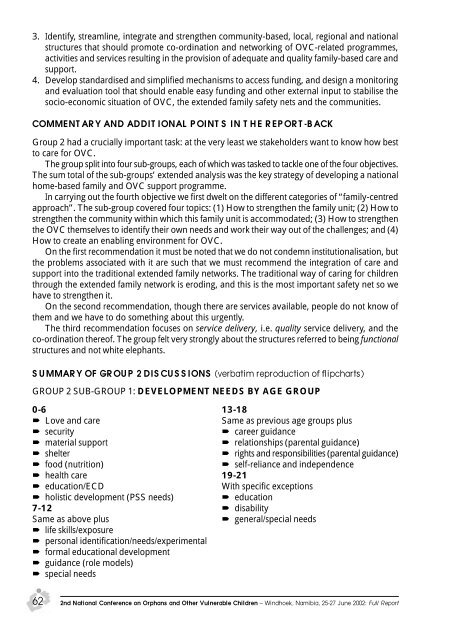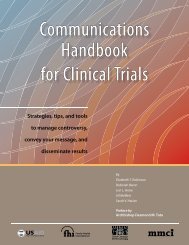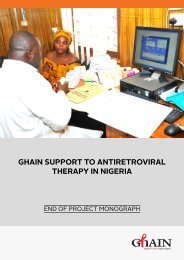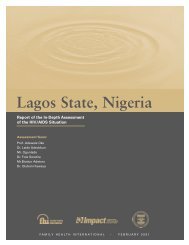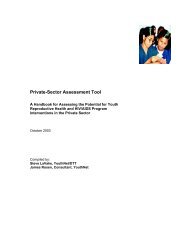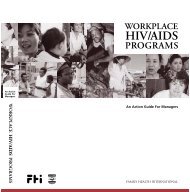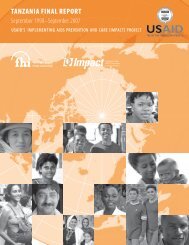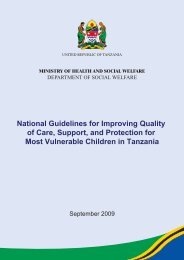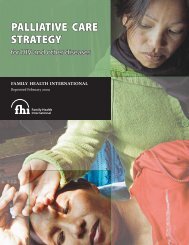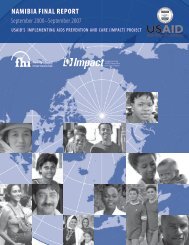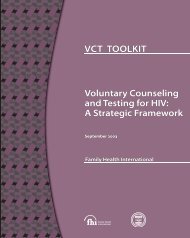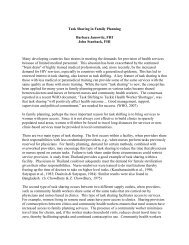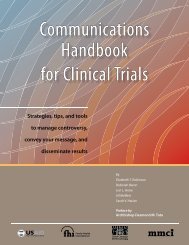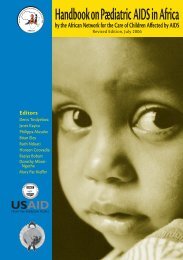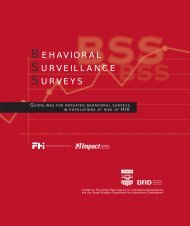2nd National Conference on Orphans and Other ... - FHI 360
2nd National Conference on Orphans and Other ... - FHI 360
2nd National Conference on Orphans and Other ... - FHI 360
Create successful ePaper yourself
Turn your PDF publications into a flip-book with our unique Google optimized e-Paper software.
3. Identify, streamline, integrate <strong>and</strong> strengthen community-based, local, regi<strong>on</strong>al <strong>and</strong> nati<strong>on</strong>al<br />
structures that should promote co-ordinati<strong>on</strong> <strong>and</strong> networking of OVC-related programmes,<br />
activities <strong>and</strong> services resulting in the provisi<strong>on</strong> of adequate <strong>and</strong> quality family-based care <strong>and</strong><br />
support.<br />
4. Develop st<strong>and</strong>ardised <strong>and</strong> simplified mechanisms to access funding, <strong>and</strong> design a m<strong>on</strong>itoring<br />
<strong>and</strong> evaluati<strong>on</strong> tool that should enable easy funding <strong>and</strong> other external input to stabilise the<br />
socio-ec<strong>on</strong>omic situati<strong>on</strong> of OVC, the extended family safety nets <strong>and</strong> the communities.<br />
COMMENTARY AND ADDITIONAL POINTS IN THE REPORT-BACK<br />
Group 2 had a crucially important task: at the very least we stakeholders want to know how best<br />
to care for OVC.<br />
The group split into four sub-groups, each of which was tasked to tackle <strong>on</strong>e of the four objectives.<br />
The sum total of the sub-groups’ extended analysis was the key strategy of developing a nati<strong>on</strong>al<br />
home-based family <strong>and</strong> OVC support programme.<br />
In carrying out the fourth objective we first dwelt <strong>on</strong> the different categories of “family-centred<br />
approach”. The sub-group covered four topics: (1) How to strengthen the family unit; (2) How to<br />
strengthen the community within which this family unit is accommodated; (3) How to strengthen<br />
the OVC themselves to identify their own needs <strong>and</strong> work their way out of the challenges; <strong>and</strong> (4)<br />
How to create an enabling envir<strong>on</strong>ment for OVC.<br />
On the first recommendati<strong>on</strong> it must be noted that we do not c<strong>on</strong>demn instituti<strong>on</strong>alisati<strong>on</strong>, but<br />
the problems associated with it are such that we must recommend the integrati<strong>on</strong> of care <strong>and</strong><br />
support into the traditi<strong>on</strong>al extended family networks. The traditi<strong>on</strong>al way of caring for children<br />
through the extended family network is eroding, <strong>and</strong> this is the most important safety net so we<br />
have to strengthen it.<br />
On the sec<strong>on</strong>d recommendati<strong>on</strong>, though there are services available, people do not know of<br />
them <strong>and</strong> we have to do something about this urgently.<br />
The third recommendati<strong>on</strong> focuses <strong>on</strong> service delivery, i.e. quality service delivery, <strong>and</strong> the<br />
co-ordinati<strong>on</strong> thereof. The group felt very str<strong>on</strong>gly about the structures referred to being functi<strong>on</strong>al<br />
structures <strong>and</strong> not white elephants.<br />
SUMMARY OF GROUP 2 DISCUSSIONS (verbatim reproducti<strong>on</strong> of flipcharts)<br />
GROUP 2 SUB-GROUP 1: DEVELOPMENT NEEDS BY AGE GROUP<br />
0-6<br />
Love <strong>and</strong> care<br />
security<br />
material support<br />
shelter<br />
food (nutriti<strong>on</strong>)<br />
health care<br />
educati<strong>on</strong>/ECD<br />
holistic development (PSS needs)<br />
7-12<br />
Same as above plus<br />
life skills/exposure<br />
pers<strong>on</strong>al identificati<strong>on</strong>/needs/experimental<br />
formal educati<strong>on</strong>al development<br />
guidance (role models)<br />
special needs<br />
13-18<br />
Same as previous age groups plus<br />
career guidance<br />
relati<strong>on</strong>ships (parental guidance)<br />
rights <strong>and</strong> resp<strong>on</strong>sibilities (parental guidance)<br />
self-reliance <strong>and</strong> independence<br />
19-21<br />
With specific excepti<strong>on</strong>s<br />
educati<strong>on</strong><br />
disability<br />
general/special needs<br />
62 <str<strong>on</strong>g>2nd</str<strong>on</strong>g> <str<strong>on</strong>g>Nati<strong>on</strong>al</str<strong>on</strong>g> <str<strong>on</strong>g>C<strong>on</strong>ference</str<strong>on</strong>g> <strong>on</strong> <strong>Orphans</strong> <strong>and</strong> <strong>Other</strong> Vulnerable Children – Windhoek, Namibia, 25-27 June 2002: Full Report


